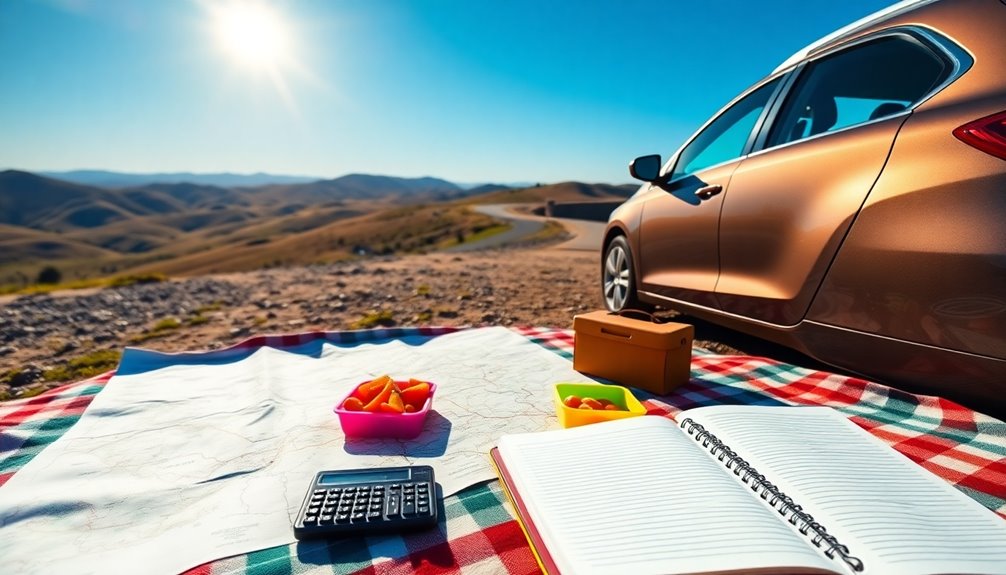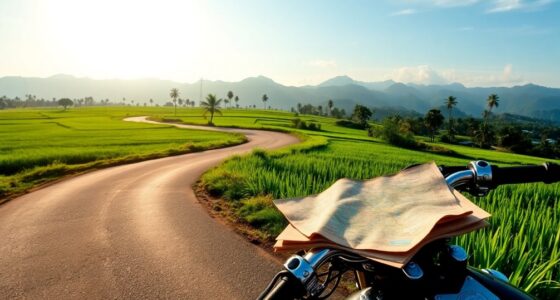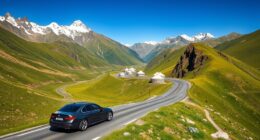A practical guide to budgeting for long-distance road trips starts with creating a solid budget that outlines your transportation, accommodation, and food expenses. Don't forget to calculate gas costs and set aside a contingency fund for emergencies. Choose a fuel-efficient vehicle to save on costs and plan your route to avoid tolls. Look for budget-friendly accommodations and local dining options to stretch your dollar further. You'll discover even more helpful tips to enhance your journey along the way.
Key Takeaways
- Create a detailed travel budget that includes transportation, accommodation, food, and a contingency fund for unexpected expenses.
- Estimate gas costs by calculating mileage, fuel efficiency, and current gas prices to set realistic savings goals.
- Choose budget-friendly accommodations like camping or affordable hotels, and plan for daily food expenses with local dining options.
- Utilize budgeting apps to track spending in real-time and regularly review expenses to adjust your budget as needed.
- Prioritize self-care on the trip by incorporating healthy eating, hydration, and regular breaks to maintain energy and well-being.
Understanding the Importance of a Travel Budget
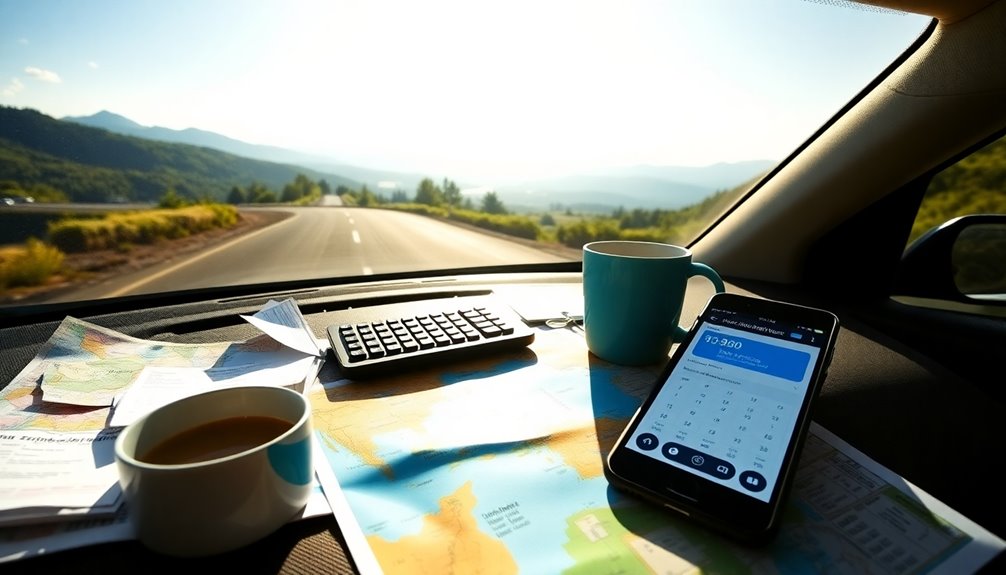
When planning a road trip, understanding the importance of a travel budget can make all the difference in your experience. A solid travel budget helps you outline expected expenses like transportation, accommodation, and food, guaranteeing you don't spend a lot on unnecessary things.
By estimating mileage and fuel costs, you can set realistic savings goals, giving you the funds needed for your trip. Tracking your spending against this budget reduces financial stress, allowing you to adjust as needed.
Plus, a well-planned travel budget highlights areas where you can save money, freeing up cash for memorable experiences like local attractions or dining. This flexible guide guarantees you adapt to unexpected costs without compromising your adventure. Additionally, considering options like water park hotels can enhance your trip while fitting within your budget.
Estimating Key Expenses for Your Trip
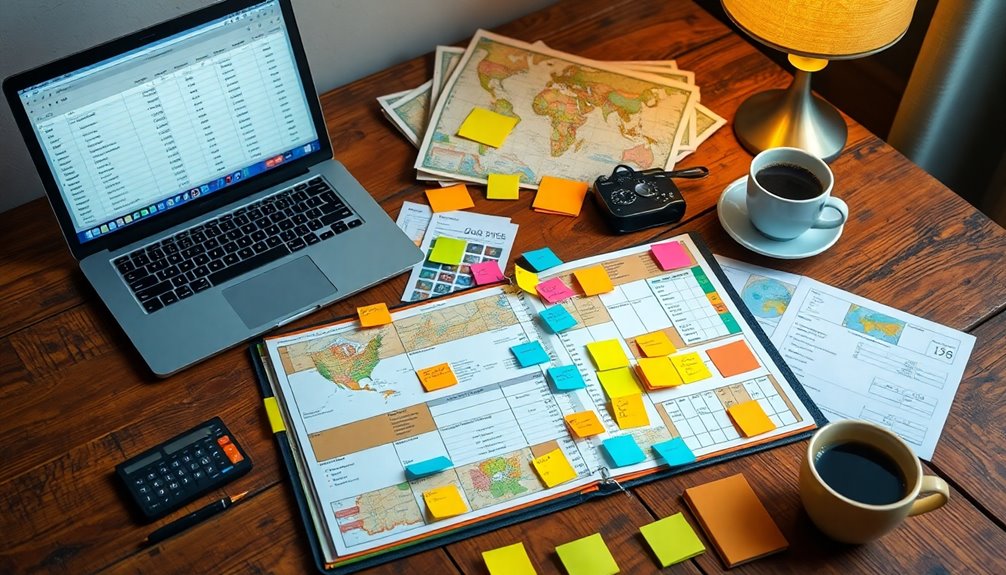
Estimating key expenses for your road trip lays the groundwork for a smooth journey.
Start by calculating your budget with these essential components:
- Gas prices: Estimate fuel costs based on your vehicle's MPG, total trip distance, and current gas prices, allowing for fluctuations.
- Accommodation: Decide between camping ($10-$40/night) or hotels ($50-$100+), depending on your route and preferences.
- Food costs: Budget $10-$15 per person for groceries and $20-$30 for dining out, multiplied by your travel days.
- Unexpected expenses: Allocate 10-15% of your overall budget for emergencies, like vehicle repairs or unplanned stops.
Don't forget to research attractions, as admission fees can vary widely, impacting your overall budget considerably.
Creating a Contingency Fund for Emergencies
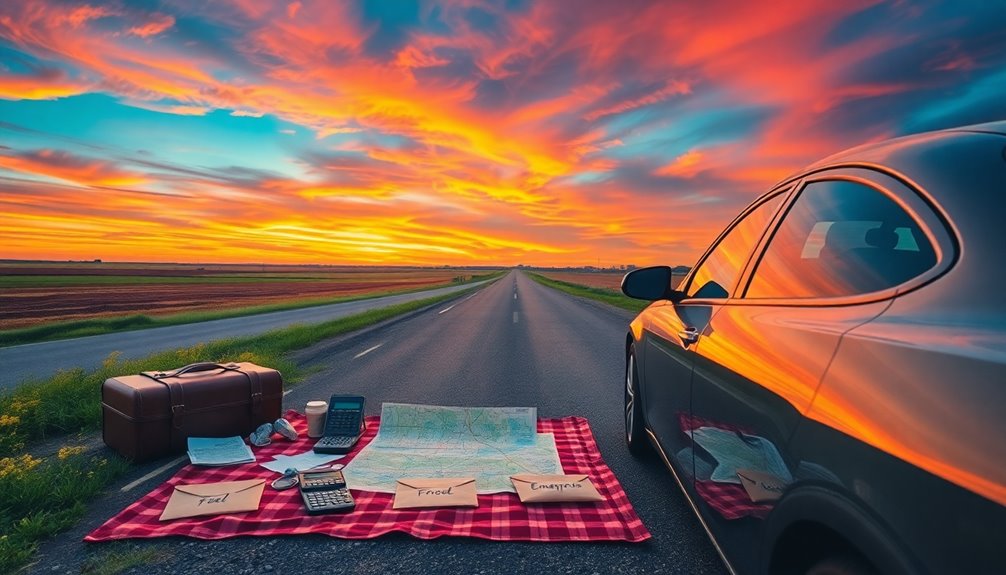
While planning your road trip, creating a contingency fund for emergencies can be a game changer. Aim to allocate 10-15% of your travel budget for unexpected expenses like vehicle repairs or emergency accommodations. Set aside at least $100-$200 to handle minor emergencies without derailing your budget.
| Contingency Fund Tips | Purpose |
|---|---|
| Allocate 10-15% of budget | Cover unexpected expenses |
| Regular vehicle maintenance | Reduce likelihood of breakdowns |
| Use budgeting apps | Track spending in real-time |
Having a solid contingency fund gives you peace of mind, letting you fully enjoy your adventure without the stress of unforeseen costs. Additionally, establishing an emergency fund can help ensure that you are prepared for any financial surprises that may arise during your journey. Keep your journey smooth and worry-free!
Choosing the Right Vehicle for Your Journey

A well-planned contingency fund sets the stage for a successful road trip, but the journey's comfort and cost-effectiveness largely depend on the vehicle you choose.
When choosing the right vehicle, consider:
- Fuel efficiency: Compact cars or hybrids often achieve 40 MPG or more, slashing gas expenses.
- Cargo capacity: Confirm your vehicle can hold all your gear while keeping passengers comfortable.
- Reliable vehicle: Opt for well-maintained cars to avoid breakdowns during long trips.
- Rental services: Explore options like ECO Mobility for clean, fuel-efficient vehicles with maintenance support.
Additionally, it's wise to look for top rated vacuums that can help keep your vehicle clean during the journey.
Planning Your Route to Minimize Costs
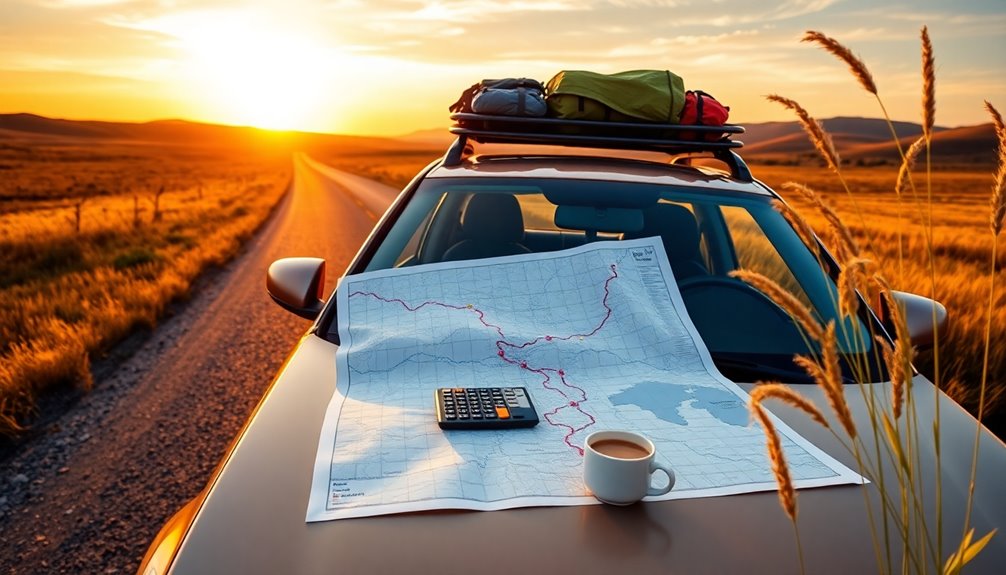
When planning your road trip, optimizing your route can greatly cut costs.
Use navigation apps to find the most fuel-efficient roads and steer clear of traffic jams.
Optimize Route Selection
To keep your road trip costs down, optimizing your route selection is essential. By planning ahead, you can guarantee your journey is both fuel-efficient and budget-friendly.
Here are some tips to help you save money:
- Use navigation apps like Google Maps or Waze to find the best routes and avoid traffic congestion.
- Travel during off-peak hours to minimize idling and save on fuel costs.
- Research toll-free routes to avoid unnecessary expenses.
- Optimize your stops by mapping them logically to prevent backtracking.
Also, consider using apps like GasBuddy to locate the cheapest gas prices along your route.
With these strategies, you'll maximize savings while enjoying your long-distance road trip!
Use Fuel-Efficient Roads
Choosing fuel-efficient roads can greatly cut down your travel costs. Use navigation apps like Google Maps or Waze to find fuel-efficient routes that minimize stops and avoid traffic congestion. Highways often provide better fuel efficiency with their higher speeds and fewer stops. Additionally, consider routes that avoid toll roads and choose flat terrains to enhance your vehicle's performance. Scheduling your drives during non-peak hours helps you dodge traffic, saving fuel and money. Here's a quick reference table to help you plan:
| Strategy | Benefit | Impact on Gas Cost |
|---|---|---|
| Use highways | Better fuel efficiency | Lowers overall spending |
| Avoid toll roads | Reduces speed-related costs | Keeps budget intact |
| Drive during off-peak hours | Minimizes traffic congestion | Cuts fuel waste |
Furthermore, many families enjoy water parks as a fun stop along their road trips, providing an opportunity to cool off and relax.
Budget-Friendly Accommodation Options
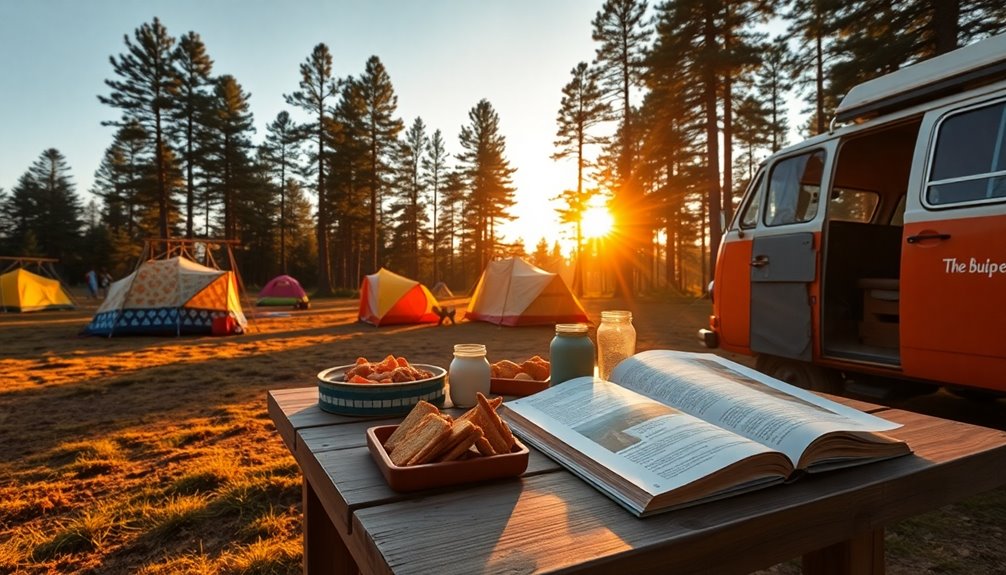
Finding budget-friendly accommodation options can make a considerable difference in your road trip expenses.
Consider these lodging options to save money without sacrificing comfort:
- Car camping: Enjoy the great outdoors with costs around $35 per night, considerably cheaper than hotels.
- Unique accommodations: Look for retro-chic motels or glamping sites that offer memorable experiences at budget-friendly prices.
- National parks: Campgrounds in national forests or state parks can range from free to $50 per night, far less than urban hotel rates.
- Shared accommodations: Use platforms like Airbnb or Couchsurfing to stay with locals, saving on lodging while gaining valuable insights.
Additionally, consider incorporating natural elements in your camping setup to enhance your outdoor experience.
Strategies for Reducing Food Expenses
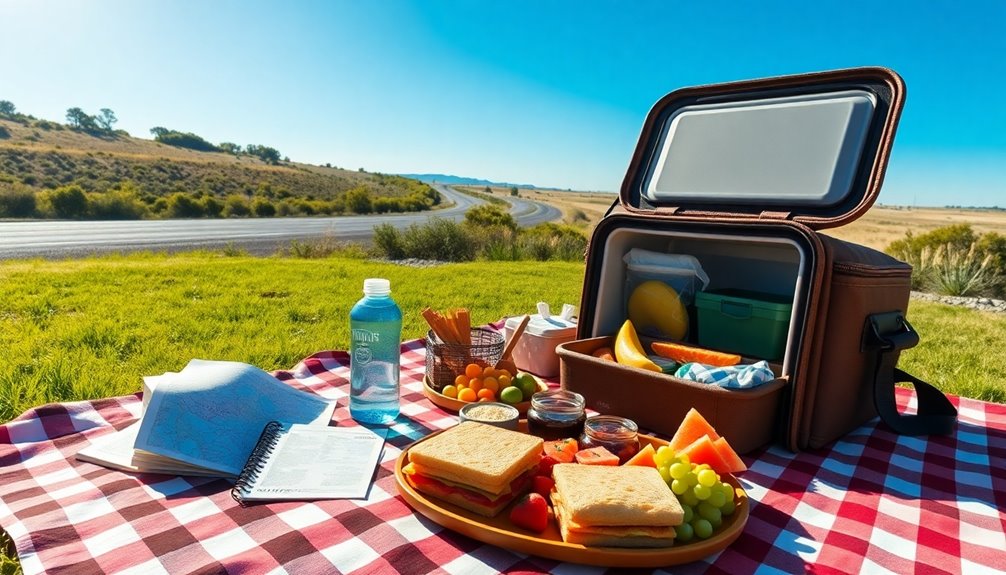
To save money on food during your road trip, consider packing your own meals and snacks. Not only will this cut costs, but it also lets you enjoy local dining experiences without breaking the bank. With a little planning, you can keep your food expenses low while still enjoying tasty options along the way. Exploring Cocoa Beach's seafood scene can be a delightful addition to your trip if you decide to dine out.
Pack Your Own Meals
Packing your own meals can greatly cut down on road trip expenses while enhancing your travel experience. By preparing food in advance, you can save money on dining out and enjoy healthier options.
Here are some strategies to contemplate:
- Pack a cooler with pre-prepared meals, snacks, and beverages.
- Buy groceries in bulk before you hit the road to lower food expenses.
- Utilize portable cooking equipment like a camp stove for fresh meals.
- Plan picnics at scenic locations for enjoyable breaks.
Additionally, being mindful of your self-care practices during the trip can help maintain your energy and overall well-being.
Local Dining Experiences
While exploring new places during your road trip, you can enjoy local dining experiences that won't break the bank.
Start by planning to eat at local dive bars or diners, where you'll find authentic meals at lower prices than touristy restaurants. This not only helps you save money but also gives you a taste of local culture.
Consider packing a cooler for picnics in scenic spots, allowing you to enjoy homemade sandwiches instead of a pricey restaurant meal.
Don't forget to check out roadside produce stands or farmers' markets for fresh, inexpensive food options. Additionally, many coastal towns, such as Anna Maria Island, FL, offer local dining options that emphasize fresh seafood and local flavors.
Budget-Friendly Snack Options
Packing your cooler with homemade goodies can greatly cut costs. Here are some ideas to help you stay on budget:
- Fresh fruits like apples or bananas for quick energy boosts
- Sandwiches made with your favorite ingredients for lunch on the go
- Trail mix or popcorn prepared at home for healthier, cheaper snacks
- Picnic-style meals with a portable grill for easy outdoor dining
In addition, consider incorporating Leave No Trace principles into your meal prep to minimize waste while enjoying your road trip.
Tips for Tracking Your Spending on the Road
How can you keep your road trip spending in check? Start by using budgeting apps like Mint or YNAB to track expenses in real-time.
Keep a detailed log of your daily spending, including fuel, food, lodging, and activities. This will help you identify areas to cut costs if needed.
Allocate specific amounts for each category, like $50 per day for food and $100 for lodging, and adjust based on your actual costs.
Don't forget to set aside 10-15% of your overall budget for unexpected expenses.
Regularly review your expenses at the end of each day or week to evaluate your financial progress and make necessary adjustments to stay on track. Additionally, consider implementing the 50/30/20 rule to better allocate your funds across different spending categories.
Frequently Asked Questions
How Much Money Should You Budget for a Road Trip?
When budgeting for a road trip, you should aim for around $100-$200 per day per person.
Allocate about 50% for transportation, including gas and maintenance, 30% for food, and 20% for lodging and activities.
Don't forget to take into account the varying costs of gas and accommodations.
It's also smart to set aside an extra 10-15% for unexpected expenses, like vehicle repairs or emergencies, to stay prepared throughout your journey.
How to Calculate Costs for a Road Trip?
To calculate costs for your road trip, start by estimating your gas expenses.
Divide your total mileage by your vehicle's MPG, then multiply by the average gas price.
Next, budget for accommodations, considering options from camping to hotels.
Don't forget food costs, aiming for around $180 weekly on groceries and dining.
Finally, set aside 10-15% of your budget for unexpected expenses, and include costs for activities and souvenirs to enhance your experience.
How Many Hours a Day Should You Drive on a Road Trip?
Driving for hours can feel exhilarating, yet exhausting. You should aim for 6 to 8 hours a day on a road trip. This balance lets you enjoy the journey without burning out.
Remember to take breaks every 2 hours to stretch and refuel. If you're traveling with others, consider sharing the driving to cover more ground comfortably.
Stay flexible, as road conditions and fatigue can shift your plans unexpectedly. Enjoy the ride!
How to Make a Budget Plan for a Road Trip Across the Country With Stops at National Parks and Landmarks and Camping and Sightseeing?
To create a budget plan for your road trip, start by estimating the total distance and calculating gas costs based on your vehicle's fuel efficiency.
Next, budget for a mix of camping and occasional hotel stays. Don't forget to allocate funds for food, planning to pack snacks while allowing for some dining out.
Include entrance fees for parks, and set aside 10-15% of your budget for unexpected expenses to stay flexible.
Conclusion
So there you have it—your ultimate roadmap to budget like a pro on your epic road trip! With a little planning and creativity, you can turn a potential money pit into a glorious treasure hunt of adventure. Remember, every dollar saved is a dollar you can spend on that mouthwatering roadside diner pie! So buckle up, hit the road, and let your budget be your co-pilot as you chase the horizon without breaking the bank! As you embark on this journey, keep an eye out for discounts and special offers that can add extra fun without straining your wallet. Consider opting for camping gear instead of hotels to stay grounded with nature while following those budget road trip tips for savings. With each small choice, you’ll not only enhance your adventure but also create lasting memories, all while keeping your finances in check. Enjoy the ride!
